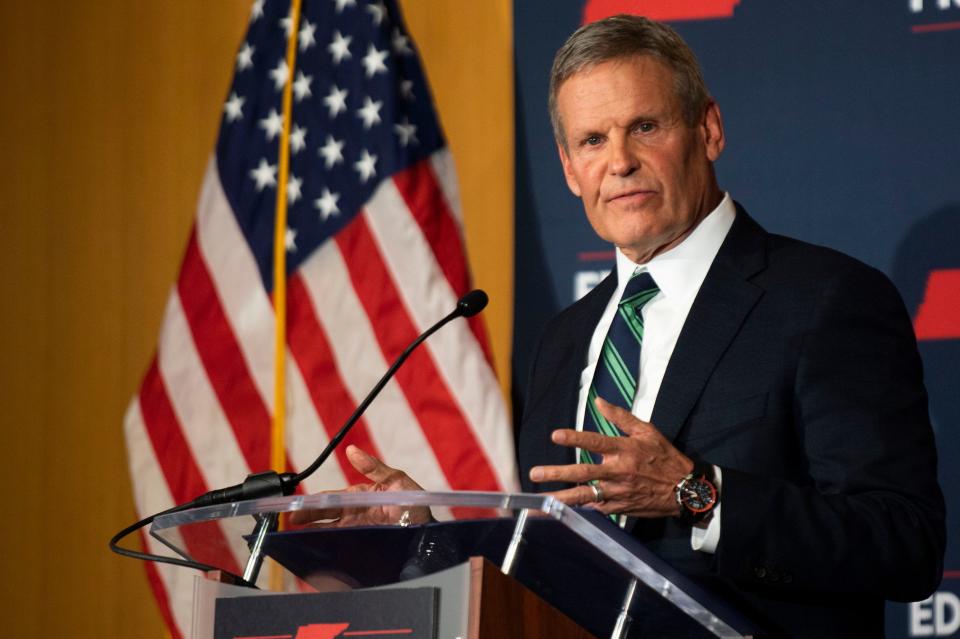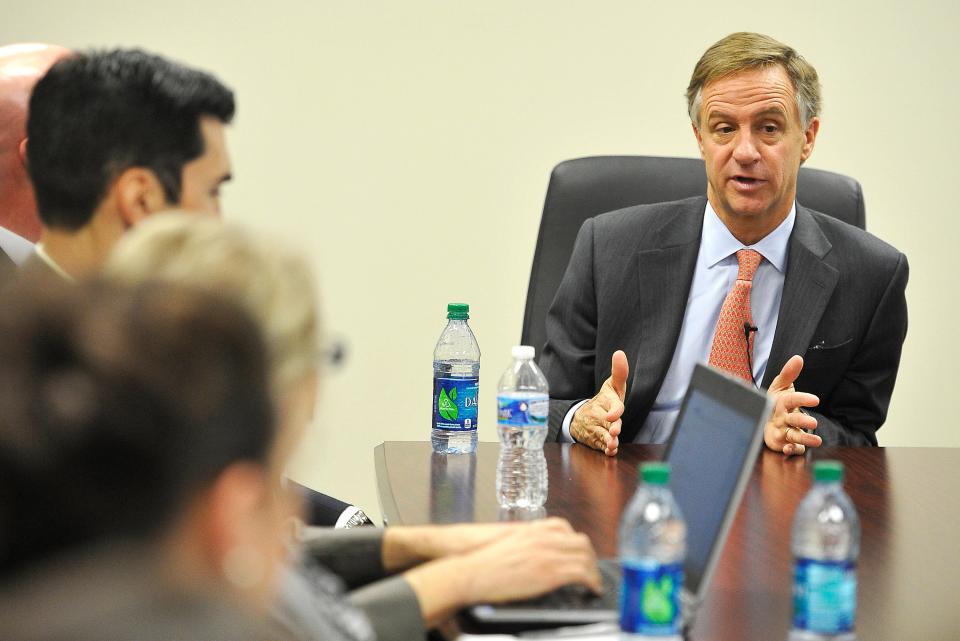Gov. Bill Lee wanted it, ordinary Tennesseans didn’t. School vouchers failed. Time to move on
- Oops!Something went wrong.Please try again later.
Tennessee Gov. Bill Lee conceded defeat Monday on his signature school voucher expansion program, saying he was "extremely disappointed" at the outcome.
That's understandable given that Lee, a Republican, and leaders of the Tennessee General Assembly's GOP super majority stood together last fall during a the kickoff event at the Tennessee State Museum effectively declaring victory even before the 2024 legislative session had begun.
Leaders denied for weeks that the Senate and House were "at odds," but they were far off in details and price tag. Governor Lee wanted a $144 million plan that took program from three counties to all 95. The Senate stayed within that budget with some policy differences related to testing and accountability. But the House wanted a massive education reform bill that cost around $400 million — presumably to persuade skeptical rural school board and county leaders into accepting the proposal. They never did.
The Senate and House never resolved their differences and the name-calling began. House Republican Caucus Chair Jeremy Faison, for example, was called a "turncoat" by libertarian commentator Hannah Cox on X.
But there's something simpler about why this effort failed: Governor Lee wanted it while ordinary Tennesseans did not.
That was a lesson he should have learned when the Tennessee General Assembly would not even give his extreme order of protection proposal a vote during a special legislative session he called last summer.
The Tennessee governor's office is weak by design
The Tennessee Constitution makes the governor weak compared to the legislature by design.

Article I, Section I of the document starts by saying: "That all power is inherent in the people ..." The legislators are the people's voices and unlike other states or the federal government where it takes a significant majority to override an executive veto, it requires only a simple majority of legislators to do it in Tennessee.
Governors have to work in tandem with the legislators in order to get their agenda passed. Despite the failure of the firearms safety legislation, Lee had a successful year in 2023 with major legislation passing on roads and infrastructure, conservation, and investments in children and families.
Those issues are big, but they are nowhere near as controversial as education reform efforts, which have galvanized parents, activists and lobbyists for decades in many states including my former home of Florida.
There is also the matter of perception. Lee framed the Education Freedom Scholarship Act as choice for children and parents. However, critics viewed it as a top-down government intervention.
If the governor considers his agenda for 2025, he may consider a trick from the book of former Republican Gov. and U.S. Sen. Lamar Alexander who walked across state in a plaid shirt to meet with the public.
Lee did something similar in his 2018 campaign for governor traveling to all 95 counties in a recreational vehicle, but maybe it's time to really get at what is eating at ordinary Tennesseans.
Vouchers may not be the No. 1 problem, but something else might be. A USA TODAY story published Sunday showed that many Americans are spending one-third of their income on child care costs. That's astounding, and supporting parents is an investment the state should consider making to help families thrive across the state.
Lee should take heart from Haslam, Bredesen and Sundquist
Lee's predecessors have faced opposition from their own party members in the past.
The late 47th Gov. Don Sundquist could not get a state income tax proposal through.
48th Gov. Phil Bredesen faced significant blowback for paring down the rolls of TennCare.
49th Gov. Bill Haslam could not get the legislature to vote on his signature Insure Tennessee law to expand Medicaid to working poor citizens.
Like Lee, those predecessors were two-term governors who faced tough political winds and later also achieved some victories.
Haslam, for example, was able to get the legislature to pass his IMPROVE Act on building roads and lowering the grocery tax, but it required Democratic support to get it to the finish line.

For those who see this as the beginning of a lame duck governorship for Lee, they should avoid that type of thinking.
That would be a disservice to citizens who expect him to be "on" for all four years of his second term -- until his successor's inauguration in January of 2027.
So, it's not too late to pivot, and like his predecessors before him, Lee will have to accept that it is time to move on to the next set of critical issues.
David Plazas is the director of opinion and engagement for the USA TODAY Network Tennessee. He is an editorial board member of The Tennessean. He hosts the Tennessee Voices videocast and curates the Tennessee Voices and Latino Tennessee Voices newsletters. Call him at (615) 259-8063, email him at dplazas@tennessean.com or tweet to him at @davidplazas.
This article originally appeared on Nashville Tennessean: Tennessee school vouchers: Expansion failed; Gov. Lee should move on

